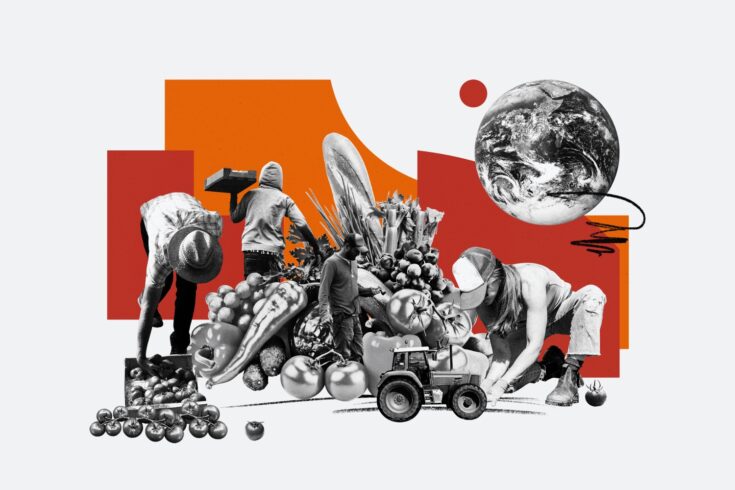How do we produce food that’s good for us without destroying the planet in the process?
It’s the common thread that’s run throughout my entire working life.
I grew up watching Sir David Attenborough presenting ‘Life on Earth’ on television. That’s where my life was. I studied biology and trained as an ecologist and had a real passion for the biodiversity on earth.
I first worked at Rothamsted Research, where I led on genetic modification and how you assess the environmental impact of genetically modified crops. I continued my research into biological sciences at Southampton University and then spent the next six years as Chief Scientific Adviser at the Food Standards Agency.
This was a particularly exciting role that saw me working with three governments on major issues such as the Novichok nerve agent crisis, regulations associated with exiting Europe and the COVID-19 pandemic, all of which had a food angle.
Throughout my career, I’ve learned that there’s a food component to most issues in society.
What do I eat?
When I go out with people, I can see them wondering ‘What’s he going to eat?’. But when you talk to most food experts, you quickly realise they don’t like the labels of ‘good’ or ‘bad’ food. It’s more about the whole diet.
I’m a keen cyclist and I used to cycle long distances. I once cycled 126 miles and stopped halfway for a cola and a cake. I needed those calories and they helped me get home. But if I’m working in London all day and have a cola and a cake each day, that wouldn’t be good for me.
It’s also much more complicated than calories alone. It’s the vitamins, the minerals and the proteins that also help me to lead a healthy life.
Meeting changing diets and behaviour
Many people are starting to radically change their diet, especially the young. I’ve spoken to clinicians who warn that people must bear in mind their body’s needs when they are doing that. Doctors I’ve spoken with also say they are starting to see a range of health issues including bone fractures and effects on fertility associated with radical changes in diet.
It’s quite challenging to be a vegan unless you think very carefully about your diet. People who are eating perhaps for the planet, or to try to reduce waste, or to make things fairer for society can’t forget that they must also give their body what it needs, which is possible but does require thinking about what to include in your diet.
The future will undoubtedly mean an increase in use of alternative proteins. But that must be a move towards nutritious foods and not more ultra-processed foods that nutritionists will tell you can be harmful whether they are meat-based or vegetarian.
In 20 to 30 years, I anticipate we will also be much more aware of waste. The cost and the consciousness of waste will likely lead to changes in behaviour, which may mean challenges associated with producing enough food become less serious, although a changing climate will be a constant threat.
This is where science and innovation can help. We can develop products that contain the right ingredients, whether that is through gene editing or more traditional means and perhaps more able to cope with a changing climate, although climate extremes can be very difficult to overcome.
Tomato that produces vitamin D
The UK’s Genetic Technology (Precision Breeding) Act 2023 opens up new opportunities for gene editing and I’ve already seen some really exciting developments. Take the John Innes Centre for example, which has genetically edited tomatoes to produce provitamin D3.
Why is that important? Well, most of us living in the UK have a shortage of vitamin D because we make most of it by going out in the sunlight. I’ve personally been diagnosed with a vitamin D deficiency. It can make you dizzy and it can make you less able to recover from illness.
Rather than taking a supplement, you would be able to eat these tomatoes and improve your health dramatically, without needing to try and expose your skin to more sunlight, which has its own risks.
Cows and greenhouse gas
Cows produce a lot of methane, which is a much more warming gas than carbon dioxide. We are involved in research on the dietary intake (animal feed) of farm animals to reduce the amount of methane produced. It’s also an area where precision breeding might enable us to genetically edit cows to produce less methane or develop feeds which mitigate methane production by cows.
People often talk about how many kilograms of plant product (approximately 6 to 10kg) a cow must eat to produce 1kg of meat that goes on to our plates. Yes, you could feed more people with that, but the dietary and nutrition issue is far more complex. It’s also a question of suitable land, as land that’s suitable for producing high quality grass isn’t necessarily suitable for growing cereals or vegetables.
Through UK Research and Innovation’s (UKRI) Transforming UK Food Systems Strategic Priorities Fund we are funding an exciting project that aims to turn grass directly into edible food products. It won’t replace meat, but grass is one thing we have a lot of in this country.
The work is combining the agricultural expertise of Harper Adams University with chemical engineering and biorefining expertise at Bath University. Researchers believe we could produce 1kg of food or high value food products from 1.5 to 2kg of grass. Needless to say, it has already piqued the interest of private investors and businesses.
Championing research and innovation in food
I’ve recently been made UKRI’s sector champion for food.
When we looked at UKRI’s investments and initiatives relating to food, it was pleasing to see there were food projects going on right across the country and right across our research councils – it truly is interdisciplinary and a national, indeed global, effort.
However, we also recognised issues around food production contributing to climate change and environmental degradation, growing obesity and type 2 diabetes, high levels of food imports and perceptions that food is a high-volume-low-profit industry, which suggests a productivity problem to some economists.
Food research and innovation also cuts across all five of UKRI’s strategic themes, from building a green future to securing better health, ageing and wellbeing.
We believe that doing more to bring together our work across councils and UKRI will help deliver greater impact from our investments. It is also an area where the public and politicians have an interest in knowing what is being done and how it affects their lives.
Making a difference
We could say to people: ‘eat more fruit and vegetables’, but we probably wouldn’t move the dial very much in terms of the population’s health, especially if the message reaches only a small section of society.
In response, people might say fruit and vegetables are too expensive, or they don’t fit in with their lifestyle. Yet these people may be those who would most benefit from such a dietary change. The social science aspect of food is critical when it comes to using research to transform the current food system.
By working together and coordinating our activities, we can look at how we grow fruit and vegetables more efficiently, how we turn them into products that people want to eat, and how we encourage children to look at fruit in the same way they look at a bar of chocolate. It also means we can be a single and more powerful voice to government departments and industry.
I will be talking to ecologists about ecological practices, to geneticists and chemists about protecting food and to social scientists about how society buys into these things.
You have to bring the right people together to work on addressing these issues, which are among the most crucial to solve if we are to have a healthy life on a healthy planet. That’s what you have to do to make a real difference.




